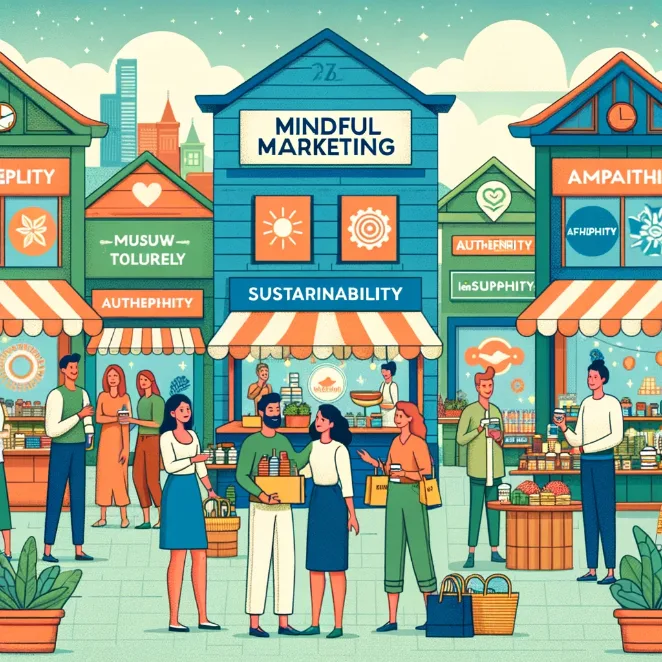
Mindfulness in Marketing: A Conscious Approac
In an era driven by consumerism and relentless advertising, businesses are increasingly embracing mindfulness as a way to connect with their audience authentically. Mindfulness in marketing represents a conscious shift away from aggressive sales tactics toward a more empathetic and human-centric approach. This article explores the growing trend of mindfulness in marketing, its principles, and the benefits it offers to both businesses and consumers.
article by Hina Kurosawa
The Mindful Revolution in Marketing: A Paradigm Shift
In today's fast-paced world, the relentless barrage of advertisements and marketing messages can often leave consumers feeling overwhelmed and disconnected. Enter the mindful revolution in marketing—a paradigm shift that acknowledges the need for businesses to engage with their audience in a more meaningful way. This shift is more than just a passing trend; it's a response to changing consumer expectations and a desire for authentic, value-driven interactions.
The concept of mindfulness, often associated with meditation and self-awareness, may seem like an unlikely fit for the world of marketing. However, it's precisely this approach that is redefining how businesses communicate and connect with their customers.

Empathy as the Foundation
At the core of mindful marketing lies empathy. It's the ability to put oneself in the shoes of the consumer, to truly understand their needs, desires, and pain points. Traditional advertising often disregards this fundamental aspect, bombarding consumers with messages that prioritize the product or service rather than the individual.
Empathetic marketing, on the other hand, takes a different route. It acknowledges that every consumer is a unique individual with their own set of values and preferences. Mindful marketers invest time in understanding their target audience, conducting research, and actively listening to feedback.

The Power of Authenticity
Authenticity is the cornerstone of mindful marketing. Businesses are encouraged to showcase their real selves—flaws and all. It's a departure from the polished, perfection-driven narratives that have dominated the advertising landscape. Today's consumers crave authenticity; they want to see the human side of brands.
This shift towards authenticity is particularly evident in social media marketing. Platforms like Instagram and TikTok have become hubs for real, unfiltered content. Influencers and businesses that embrace authenticity by sharing their unvarnished experiences often resonate more with their followers.

The Mutual Benefits
The benefits of mindful marketing extend beyond building customer loyalty. Businesses that adopt this approach often find that their brand reputation improves significantly. They become known for their transparency, authenticity, and commitment to social and environmental responsibility.
Employees within these organizations also tend to experience higher morale. They work for companies that align with their own values, which can lead to increased job satisfaction and productivity.
On the consumer side, the impact is equally positive. Mindful marketing offers a less intrusive and more meaningful advertising experience. It empowers individuals to make informed choices based on their values and preferences. Instead of feeling manipulated, consumers feel respected and valued.

The Mindful Path Forward
As the mindful revolution in marketing continues to gain momentum, it's clear that this approach is here to stay. In an age where consumers are seeking more profound connections and meaningful experiences, businesses have a unique opportunity to redefine their relationships with their audience.
By embracing authenticity, empathy, and sustainability, companies can become more than just sellers of products or services; they can become partners in their customers' journey toward a more conscious and fulfilling life.
The mindful future of marketing is not about abandoning traditional advertising methods but rather evolving them to align with the changing expectations of consumers. It's a path that leads to stronger, more meaningful connections between businesses and their customers, benefitting both parties in the process.
Published: 12/4/2023
Modified: 12/5/2023
More predictions
Come back here soon to learn more about yourself and your future


Harnessing Meditation For Stress Relief & Relaxation
Discover the nuances of meditation as a practice for relaxation and how it transcends basic stress relief techniques.


Meditation & Mindfulness: Are They One & the Same?
Delve into the similarities and differences between meditation and mindfulness to understand how both practices can contribute to a more serene life.


Meditation vs Therapy: A Complementary Approach
Explore if meditation can stand in for therapy and how these practices might work together for mental well-being.